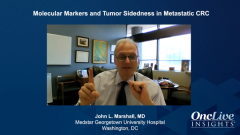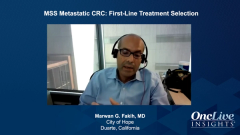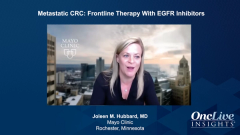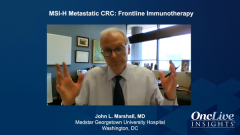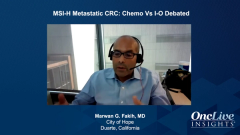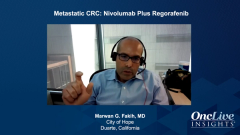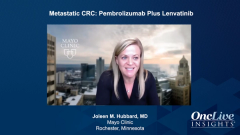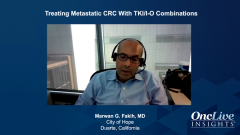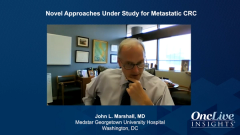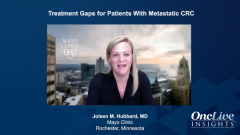
Treatment Gaps for Patients With Metastatic CRC
Reactions to the increase in prevalence of metastatic colorectal cancer (CRC) among a younger patient population despite treatment advances.
Episodes in this series

John L. Marshall, MD: Hi everybody, my name is Dr John Marshall, coming to you live from Georgetown University in Washington, DC, in July 2021. The new residents, the new fellows are here, but we've just had some graduate as well. We also have some new attendings out there who are interested in what's going on in the world of colorectal cancer; and new therapies.
Joining me today are good friends, and honestly, world experts in the field. I'm really looking forward to hearing from them. First, I am joined by Dr Marwan Fakih, from City of Hope. Marwan, how's it going out there?
Marwan G. Fakih, MD: It great here, John. It’s good to be with you again, and with Joleen. I am happy to be here.
John L. Marshall, MD: We're looking forward to your comments.
Also joining the discussion is my great friend, Dr Joleen Hubbard, from Mayo Clinic. Joleen, how are things going there?
Joleen M. Hubbard, MD: Great, John. Thanks for asking. I am happy to be here.
John L. Marshall, MD: Great, and thank you guys for joining.
Joleen, I'll pick on you first. Give us your overview of the world of colorectal cancer. How are we doing? How is survival going? What are your feelings about our progress over the last 5 years or so?
Joleen M. Hubbard, MD: Well, John, I think over the past 5 years we have made a lot of progress. I think that's due to the findings with immunotherapy in first-line setting for MSI [microsatellite instability]-high cancers and narrowing things down with EGFR inhibitors for RAS and BRAF wild-type patients. We have better strategies for maintenance therapy and chemotherapy holidays, etc. Also, we are pushing the boundaries on metastasectomies for those with potentially resectable disease. And also, with more intensive therapy—with regimens such as FOLFOXIRI [5-FU, folinic acid and irinotecan]/bevacizumab up front, I think we're pushing survival outcomes. Survival outcomes used to be approximately 2, 2.5 years. Now, it's not uncommon for me to have patients out 3, 3.5, 4 years with metastatic colorectal cancer who are doing well. So, I think we've made a lot of progress. Obviously, we need to make a lot more progress, especially for certain populations like the KRAS-mutant patients. But overall, a lot of progress is being made.
I think the one thing that we've been seeing for reasons that are not clear are younger and younger patients presenting with metastatic colorectal cancer. I think that's our biggest challenge. How do we address this younger patient population? Are there ways to screen, prevent the cancer? And when it comes to treatment, how aggressive do we become? Etc.
John L. Marshall, MD: Yeah. Tomorrow morning I'm going to be seeing a 44-year-old patient who, out of the blue, has multiple tumorous liver metastases, colonic primary. Her life was going along just fine. I don't know what's going on here. We are doing some research in this space to try and figure this out, but Joleen, what's your take on shifting the screening to age 45? I'll start by saying that it's good, but it won't solve the problem.
Joleen M. Hubbard, MD: Yeah, I completely agree. I get lots of 30- and 40-year-old patients in my clinic as well. So while moving the screening age up is certainly good, I agree that there's still going to be a large number of patients we are not capturing. Hopefully in the future, with circulating markers, things like that, we can identify high-risk patients and get them screened earlier. But, it's going to be a large challenge. And, it's unclear… We think it's related to diet and lifestyle changes, but I have plenty of young, healthy, active patients who are also being diagnosed. So there isn't a clear-cut patient population for which we know we need to start screening earlier, with the exception of the inherited or family-related malignancies.
Transcript Edited for Clarity


